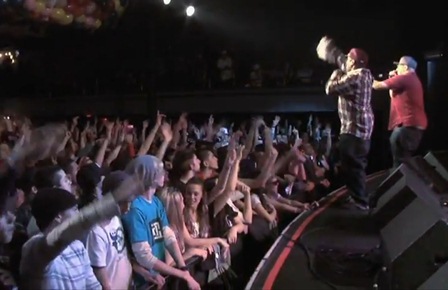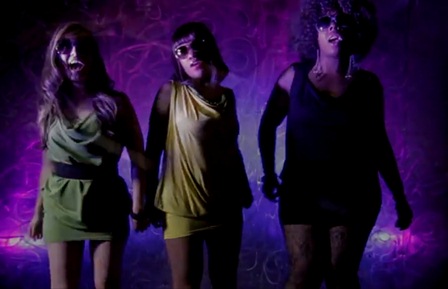 Jonathan Norman aka Smurf Luchiano |
This is part two of a three part series on the crackdown on hip-hop in Portland. Part one examined the history of tensions and the application of dress codes. Part three will explore how the growth of Portland hip-hop is affected and how the crackdown plays into gentrification.
Security
While dress codes have prevented some people from attending hip-hop events, the cost of security has discouraged some artists from putting them on in the first place.
Jonathan Norman, who goes by the stage name Smurf Luchiano, says hip-hop shows tend to have double or triple the security of other genres, which is often an expense passed on to the promoters and performers.
"Promoters are charging us double or triple what other promoters are charging us to do the same thing so it makes it hard for us to win and make money," he says. "On the business end, it makes you not want to do production."
Benjamin Eshbach, general manager of the Mt. Tabor Theater, says that he provides more security for hip-hop shows because he's had the most fights at them. The amount of security detail for a show depends on the size of the crowd, so for example, if an event dictates that there should be four guards, he says he'll request five or six for a hip-hop show. According to Eshbach, it can cost upwards of $100 a night per guard at Mt. Tabor events.
Another factor in the increased security is the influence of Portland Police and the Oregon Liquor Control Commission (OLCC).
 Eshback says that if he gets a call from either, saying they noticed a certain artist on his list, they'll suggest beefed up security, which will get passed on as an added expense to whoever is renting the venue that evening.
Eshback says that if he gets a call from either, saying they noticed a certain artist on his list, they'll suggest beefed up security, which will get passed on as an added expense to whoever is renting the venue that evening.
Christie Scott, the Public Affairs Specialist for the OLCC, says the group does make recommendations to clubs, but their role is sometimes exaggerated.
"We can only put restrictions on certain hours for entertainment," she says. "If there is a certain DJ, who every time he comes in there's a fight, we can recommend more security.
"Sometimes bar owners will cancel a performer and blame it on the OLCC. It happens frequently. The OLCC is an easy target."
When the OLCC contacts a venue about problems, Scott says it's an intervention effort to take care of an issue before they have to cancel the venue's liquor license. Scott says the group wants to see businesses succeed and make sure no one gets hurt.
"One bad incident can ruin business," says Sergeant Pete Simpson of the Portland Police Bureau. "If it's a hip-hop show, fairly or unfairly, that goes on to the next show."
He says the police encourage increasing security when venues reach out to them. The police help licensed security companies and promoters reach agreements on clothing and reentry policies, as well as precautionary measures.
 Cool Nutz and Maniac Lok performing at the |
According to Simpson, the biggest problem is when people shortcut safety measures.
While there aren't many problems, for the most part, he says another key is communication between the police and performers. Simpson says that while he was working with the Gang Enforcement Team, he would build good relationships with some prominent local artists and the result was that shows would go off without problems.
Ultimately, he says the onus is on the establishment to work with the artists and determine the security they need.
David Leiken, owner of the Roseland Theater, says it is prudent to include security.
"With lots of the shows that play, we don't have to worry about guns," he says. "With certain hip-hop shows, that's a valid worry."
Leiken says he wants to be ahead of the game and keep problems to a minimum. For any sellout show, security at the Roseland can run anywhere between $1200 and $2000. He says the typical hip-hop show is in the middle and there are some at the top. Although Leiken says there is no difference between hip-hop and heavy metal when it comes to these issues, he says there is no other genre with security as high as hip-hop.
The Roseland maintains an active hip-hop line-up, but Leiken says he will say no to act when he doesn't feel that the potential for problems is worth it.
 Rose Bent |
Local artists are concerned that unfortunate incidents at other shows have painted hip-hop as a whole as problematic.
"Everybody is getting a black eye behind it," says Norman.
Hip-Hop group Rose Bent recently had a show to promote their latest mixtape "Crimson Skies" cancelled at Ash Street Saloon. The group consists of women who do extensive work giving back to the community and describe themselves as "your nicest hometown girls". Also, they say they haven't had any fighting or violent incidents at their shows, yet they feel they've been caught in the bad shadow cast on hip-hop.
Randal Wyatt, of the group Speaker Minds, has experienced similar issues as some of the clubs Speaker Minds used to frequent changed ownership and modified their policies.
"It comes down to not generalizing or stereotyping a genre as a whole and doing your research," he says. "Like 15 years ago you had to have a demo to get booked. You had to listen to the music and not just take somebody's word to get booked."
Norman sees it as an infringement on hip-hop artists' right to do business.
"We all as American citizens have the right to make an honest living," he says. "Rules and regulations should be set for everyone there and we should all have to follow one rule."
Next Week Part 3: Growth, Gentrification and Finding a Solution













































































































































































































































































































